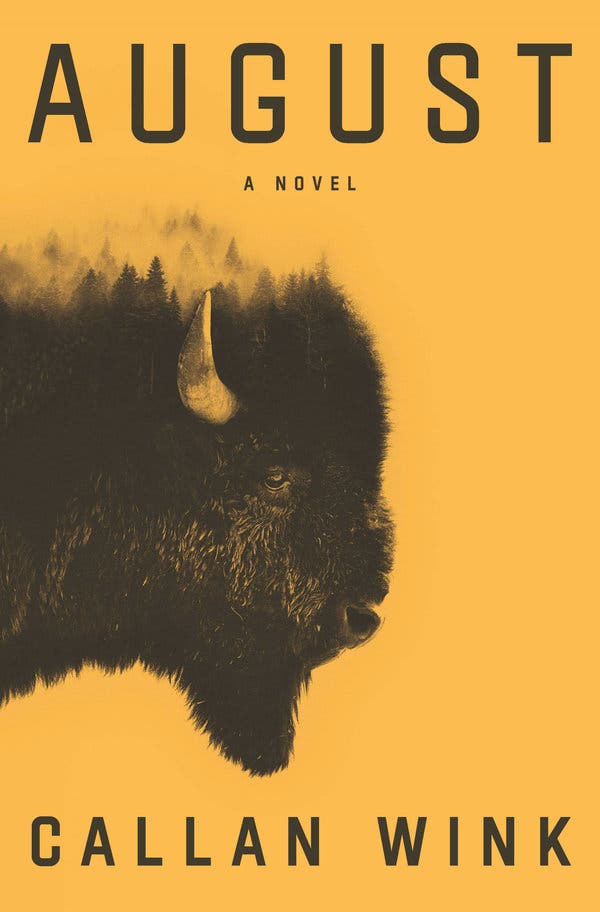AUGUST
By Callan Wink
America has always had an uncomfortable relationship with its intellectuals — there’s no shortage of evidence lately that hostility toward nuance and sensitivity is a winning strategy in this country. Based on his debut novel, “August,” Callan Wink seems both attuned to this unfortunate condition of American life and prey to it, which is too bad. A writer with his gifts should feel more comfortable wielding them.
Set in Michigan and Montana, “August” is a coming-of-age story that takes place in a heartland both idyllic and less than ideal. In Wink’s vision, it comprises towns with names like Wisdom and men with names like Ancient, whose “idea of entertainment is changing the oil on a tractor.” Farmer-philosophers. Straight-shooting cowboys. Men’s men.
The title character first appears as a 12-year-old boy on a Michigan dairy farm, where the hayloft is overrun by cats and his parents’ marriage is failing. His father is a simple man with simple notions about women. His Manic Pixie Dream Mother is eccentric and unknowable, a frustrated college graduate who feels suffocated.
It’s a glimpse of the toxic birthright August is inheriting, one that ensures he will grow to be awkward (or worse) with women, and suspicious of education, big-city living and colorful shirts. His mother rightly senses that a boy whose father pays him per tail to exterminate cats stands little chance of becoming the kind of man she wishes she’d married. Inspired by Jim Harrison’s “Legends of the Fall” — and by Brad Pitt in the film adaptation — she hauls him to Montana. The Big Sky there is freeing, but the misogyny is just as insidious.

Over time, August grows to suspect that all the macho posturing and bad fatherly advice aren’t adding up to much besides a broken heart and some football-induced headaches. A disturbing #MeToo-type episode underlines the stakes, but Wink’s female characters are so underdeveloped that it fails to be the defining moment it was clearly intended to be. What’s less clear is how we’re supposed to feel about August. As a teenager, he thinks and speaks in the laconic language of a middle-aged malcontent of Raymond Carver’s. No time for women. No stomach for dancing. P.B.R. and pickup trucks: Those are OK.
Not that there’s anything wrong with tough guys, per se. The kid just isn’t very likable. Wink’s powers are stunning when he describes in crisp, unsentimental prose the physical world framing August’s journey: the breath of cattle on a midwinter day, the taste of raw milk from a Mason jar. But as our guide to this rugged landscape, August is less a person than a caricature, pretentiously unpretentious.
At root, Wink seems to want it both ways — to criticize all that tough-guy distancing while regularly indulging it. In several awkward passages, he sidles into complex ideas but doesn’t want to own them. “In a sophomore English class he’d taken at Park High, Mrs. Defrain was always going on about the objective correlative,” Wink writes, following a string of his own beautiful descriptions exemplifying just that concept. “As far as he could tell, it was just a fancy-sounding name for a trick writers used to portray a mood in their characters.”
None of that fancy writin’ stuff for August — or for Wink, a former Stegner fellow at Stanford. I get it. Any well-educated American man who grew up in flyover country will be familiar with the pressures, which foster a kind of bipolar intellectual insecurity. They give rise to overrated writers like Cormac McCarthy who want you to know they aren’t elitists even as they drop an expensive word or idea now and then, just to make it clear they could afford it.
Wink, who is both a short story writer and a fly-fishing guide in Montana, would do well to avoid such traps, though it’s obvious where his affinities lie; lest we miss the point, the book’s publicity material notes that “Callan makes his life far away from literary circles.” Got it. Despite his abundance of lyrical talent, we’ll be sure not to mistake him for some effete literary type.
 EU News Digest Latest News & Updates
EU News Digest Latest News & Updates



